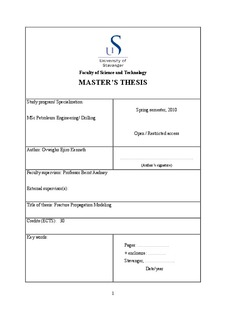| dc.contributor.author | Ovwigho, Ejiro Kenneth | |
| dc.date.accessioned | 2010-10-23T11:05:45Z | |
| dc.date.available | 2010-10-23T11:05:45Z | |
| dc.date.issued | 2010 | |
| dc.identifier.uri | http://hdl.handle.net/11250/183281 | |
| dc.description | Master's thesis in Petroleum engineering | en_US |
| dc.description.abstract | In oil and gas production, hydraulic fracturing is often performed to increase the productivity
of hydrocarbon reservoirs. During drilling operation, when the differential well pressure
exceeds the strength of the formation, it causes undesired well fracturing. As a result, this
cause loss of circulation and other associated problems.
This thesis seeks to understand the fracture propagation process through a review of previous
works, and deriving new fracture models. A review of the basic concepts of rock mechanics
required to understand this work is presented.
Based on various fracture geometry scenarios, new fracture propagation models are derived.
These derived models are then compared with experimental data. A diffusivity equation for
fluid flow in fractures is presented. A qualitative comparison analysis of fracture propagation
velocity is also presented.
Experiments are conducted to understand the fracture propagation process and results are
presented. Finally, recommendations are made and the appropriate conclusions are presented. | en_US |
| dc.language.iso | eng | en_US |
| dc.publisher | University of Stavanger, Norway | en_US |
| dc.relation.ispartofseries | Masteroppgave/UIS-TN-IPT/2010; | |
| dc.subject | petroleumsteknologi | en_US |
| dc.subject | boreteknologi | en_US |
| dc.title | Fracture propagation modeling | en_US |
| dc.type | Master thesis | en_US |
| dc.subject.nsi | VDP::Technology: 500::Rock and petroleum disciplines: 510 | en_US |
| dc.source.pagenumber | 105 p. | en_US |
